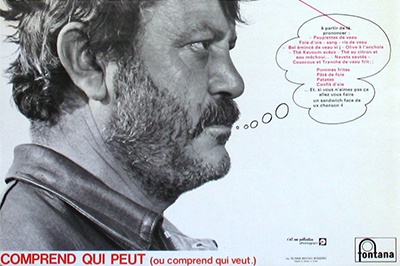The art of spoonerism
Spoonerism consists in switching letters, syllables and sounds in a sentence to create an entirely different sentence, most often salacious or irreverent in French. This funny and poetic verbal game inspired many artists.
The art of spoonerism
Joël Martin, a journalist at the French weekly newspaper "Le Canard enchaîné", described spoonerism as "l’art de décaler les sons" (the art of switching sounds). In this explanation, switching the "c" and "s" creates an entire different sentence: "l'art de dessaler les cons" (the art of desalinating idiots)...
Spoonerism thus consists in switching phonemes, syllables or letters to give a sentence a completely different oral meaning. It is hard to date this oral game. The first written proof dates back to the 16th century, with François Rabelais: in his famous novel "Pantagruel", the writer plays with the sound similarity between "femme folle à la messe" (insane woman at mass) and "femme molle à la fesse" (woman with flabby buttocks). At the time, this joke was not only funny; it was a way to upset proper etiquette. Under a supposedly serious sentence, a salacious innuendo is hiding.

Boby Lapointe, a subtitled singer
Boby Lapointe (1922-1972) was a master of spoonerism, but before becoming a renowned songwriter and singer, he was first a mathematician. Indeed, one needs an implacable logic and scientific accuracy to make so many puns and spoonerism one after the other. Filmmaker François Truffaut has even subtitled the songs “Framboise” and “Marcelle” played in the movie “Shoot the piano player". However, what provocative Lapointe liked most was how difficult it was to understand the hidden meaning of his spoonerism!
Now that you know what his songs contain, will you be able to understand the real meaning behind "mère habile" and "grasse matinée" that Boby Lapointe liked so much? If you get lost in the ward of torts – sorry, the art of words – of the famous author or if you wish to become a master spoonerist in French, TV5 Monde offers a full article on spoonerism.


